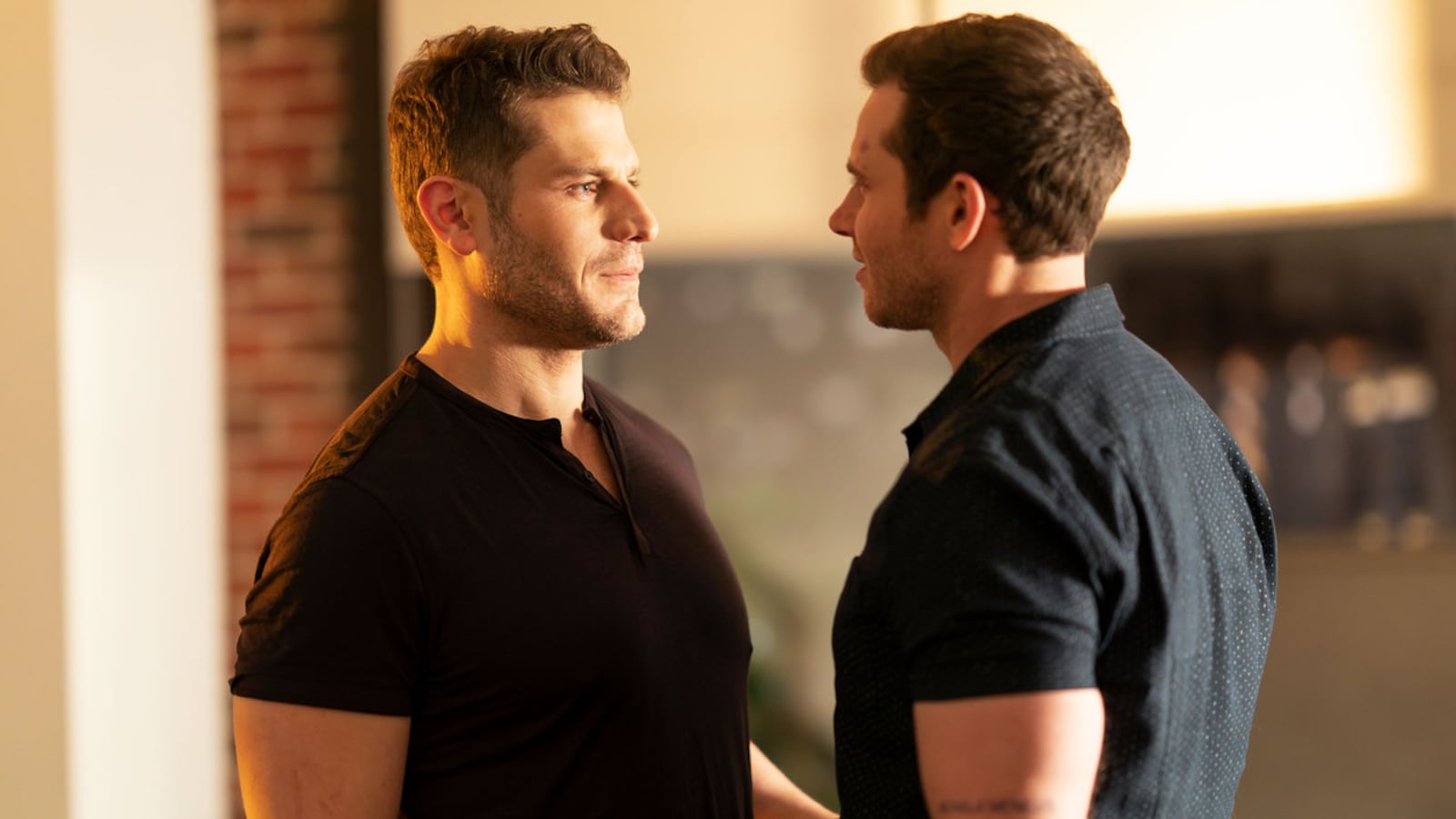As someone who grew up with a Tumblr blog dedicated to Teen Wolf, Supernatural, and Glee, I spent most of my adolescence exploring the queer potential of various shows—just like any queer kid who spent time in fandom spaces. These shows all alluded to some of their most beloved characters being queer, and only some of them actually followed through. This is called queerbaiting, a term which refers to when shows and their creators use queer coding to keep viewers’ attention, without ever fully actualizing these relationships. Despite this, there’s one show, perhaps the most surprising of all the shows to have ever queer baited its audience, that has finally put its money where its mouth is.
Celebrating its 100th episode on April 4, ABC’s 9-1-1 did the unthinkable: it made the long-speculated queerness of Evan “Buck” Buckley (Oliver Stark) a reality. Since his introduction in the popular (and notably wacky) first-responder drama’s first episode, Buck has been the topic of much speculation within the fandom. Namely, his relationship with his co-worker Edmundo “Eddie” Díaz (Ryan Guzman) has been the backdrop of fanfiction and fancams that deserve to be hung up in the Louvre.
“There’s intimacy, vulnerability and a deep trust in that relationship,” Miya, a 24-year-old who binged the entire show in 2022, tells The Daily Beast of their affection for Buck and Eddie. “Their chemistry is electric and palpable.”
Miya’s is a representative comment about the scene-stealing pair. And, like any other show that amassas an online fandom, fans always wondered if the queer hints sprinkled throughout the show would ever come to fruition.
Finally, it did. In the show’s seventh season, its first on ABC (it previously aired on Fox), Buck finally came out. After spending Episode 4, aptly titled “Buck, Bothered, and Bewildered,” growing increasingly jealous of Eddie’s newfound friendship with Tommy Kinard (Lou Ferrigno, Jr.)—a former firefighter who previously worked at Station 118 with the crew—Buck finally found himself alone with the object of his ire. When alone, he began to realize that his complicated feelings were about much more than friendship, and he wanted Tommy to notice him instead of Eddie. Considering that fans have been pushing for Buck and Eddie to seal the deal for the entirety of the show’s six year run thus far—a particularly long time for fans to project a queer relationship upon TV characters—even if Buck and Tommy hadn’t sealed the deal with a kiss before the episode wrapped up, it would be an undeniably queer storyline.
But how did a network drama about first responders even cultivate such a queer audience in the first place, helping to make Buck one of the most speculated queer figures in modern television? It’s the “found family aspect of it all,” says 23-year-old writer and director Zoë, who started watching the show after seeing tweets about Buck and Eddie’s relationship. “Many online queer audiences are online simply because they feel like they can connect with characters [on screen] and other viewers in a way that they can’t in their real lives.”

Buck (Oliver Stark) and Eddie (Ryan Guzman) remain the fan-favorite ship.
Disney / Chris WillardDespite the procedural drama’s online popularity being more mystifying due to its viewership being predominantly adults aged 18-49—unlike Supernatural, a sci-fi show that was popular among teens on Tumblr—fans of 9-1-1 have cultivated one of the most notable fandoms around. Since 9-1-1 debuted in 2018, fans have clamored on Twitter and Tumblr about what each word that passes between them could mean. With 28,692 works on fanfiction website Archive of Our Own, and 22,009 of those being written about Buck and Eddie (or “Buddie,” as fans call them), their relationship is undeniably what keeps many young fans watching.
Every time Buck and Eddie are on screen together, says grad student and 9-1-1 fan Michela, the scenes unravel like a typical fanfic. There’s a “ridiculous [amount] of shots of them just staring at each other,” says Michela, “[and] they also have keys to each other’s apartments. That, paired with the fact that they keep saving each other from dying, makes them a really compelling couple.”
Another part of the appeal of Buddie—and particularly Buck’s coming out—is how well it was handled. Previous iterations of a character coming out this late into a series are undeniably worse, or less impactful. One of the most prevalent examples in recent years is Castiel (Misha Collins) in Supernatural—one half of perhaps modern TV’s most notorious queerbait-y ship.
Throughout the latter half of Supernatural, Castiel fought demons alongside the Winchester brothers, becoming a close companion and fan-favorite character. A large part of that popularity was due to the character’s queer undertones, which many fans particularly saw in his relationship with Dean Winchester (Jensen Ackles). Fans of the show, which ended in November 2020, still cheer on a romance between the two: As of May 2024, the Archive of Our Own tag dedicated to Castiel and Dean has amassed a whopping 106,794 works, in which they tend to hunt demons together, save each other’s lives, and turn unrequited love to full on requited love.
The show played into this pairing without confirming it for much of its run, and the level of queerbaiting became infamous. But in the show’s 15th and final season—seven of which featured Castiel—Castiel confessed his love for Dean in one of its last episodes … before being sucked into a black orb and dying. While Supernatural is about demon hunters, having a queer-coded character killed off immediately after confessing his love to his best friend wasn’t received well by many fans.
To Michela, a fan of the show, Castiel’s coming out ultimately left a bad taste in her mouth. “Do I feel great on a rewatch of Supernatural knowing that the gay subtext is textual and the longing stares are in fact because Cas and Dean were in love? Yes. Do I think that any of that now gets to count as queer representation? No, not really.” (Collins, however, didn’t agree with this popular assessment.)
There’s a difference, though, between what Supernatural attempted to do, what Succession did, and what 9-1-1 is currently doing. The procedural drama has reinvented what it means to not only allow characters to be queer, but how writers, showrunners, and actors have engaged in fandom spaces as well. Here, it feels like they’re not only listening to their audience, but also allowing Buck the grace of realizing his queerness in a timely manner. While Buck’s attraction to women has been on full display in the past, now he finally gets to explore this other side of his sexuality.
Unlike Supernatural’s Castiel, “Buck is still alive,” says Zoë. “It’s one thing to say a character is queer, but to show them openly and explicitly being queer, whether that’s in a relationship or actively seeking to explore their sexuality, is a whole other thing.”
And it’s a great thing, at that: Since his coming out, we’ve seen Buck explore not only his relationship with Tommy, but also his identity as a bisexual man. Following his kiss with Tommy, the season’s sixth episode, “There Goes The Groom,” sees Buck accidentally coming out to the rest of the team, with his face covered in ash after giving his partner—who just returned from a shift—a passionate kiss. Many of the looks on the team's faces suggest that they’re not surprised, which is how the fans felt as well.
Of course, though, there are fans who hope Buck can recontextualize his relationship with one man in particular, and that’s Eddie. While actor Ryan Guzman himself has hinted at the two “get[ting] closer than ever” this season, there’s still a sense of trepidation in the fandom, as well as tension between fans who enjoy Buck’s relationship with Tommy and those who strictly want a Buddie romance.
Zoë, however, isn’t rushing things. “The fun is in the chase,” she tells us. “Some fans want Buck and Eddie together as soon as possible, and I don’t think that’s realistic. I’d like to see [Buck] explore that side of his sexuality more before he settles down with Eddie. Plus, Eddie isn’t even out yet.” Despite this, with Buck finally being queer, there will undeniably be many scenes to come that will be the spark that lights a thousand new fanworks.
9-1-1 is in a strange position as a network show, and, as Miya states, we need to remember that the series’ whopping 5 million-ish current viewers aren’t all members of its online fandom. “As much as I want Buddie [to be canon], they still have to sell that relationship to the general audience who currently have only seen [the two] as friends.” Now, instead of a will-they-won't-they situation involving the creators acknowledging Buck’s queer coding, the fans are stuck in limbo with regards to his relationship with his best friend.
Despite this, whether or not the two end up in a relationship in this season or the many to come, there’s no doubt that Buck’s coming out marks a milestone on network television. While it took him longer than some fans wanted, that Buck came out in the series’ seventh season is better than him never coming out at all—just like many other characters before him.






